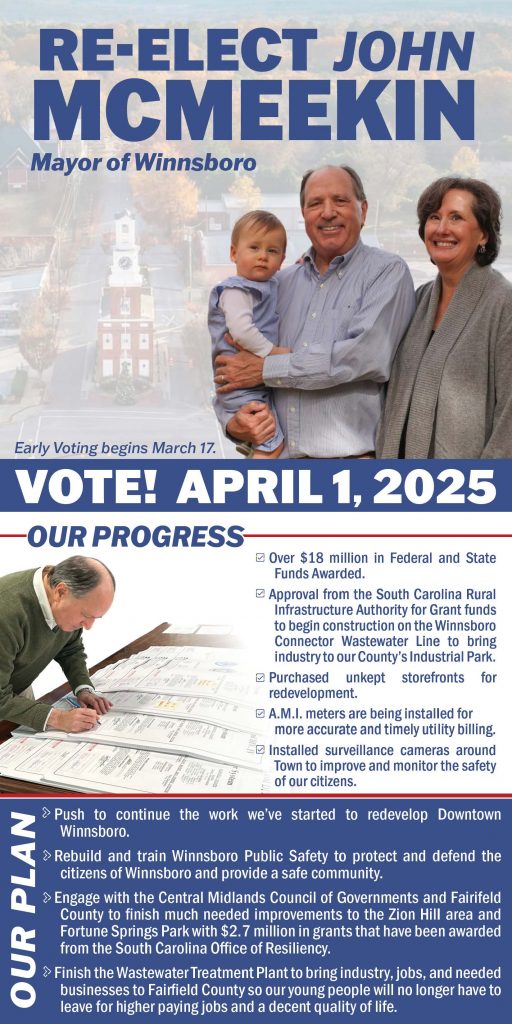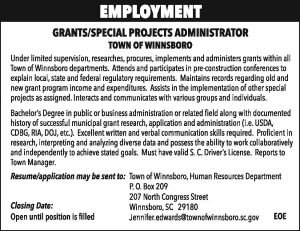WINNSBORO – Privately run residential projects like the fallow Teacher Village development qualify for the same tax credits as those normally reserved for heavy industry, according to a recent court decision.
On July 8, in a six-page opinion, the SC Court of Appeals ruled that a proposed student housing project in Columbia is a commercial venture, thus qualifying it for tax incentives.
Commercial projects qualify for economic development tax breaks; residential projects generally do not.
“This appeal centers on the meaning of ‘industrial or business’ in the application of the statute. Dormitories are commercial enterprises that fall within the definition of ‘business,’” Justice James Lockemy wrote in the opinion.
Justices Stephanie McDonald and Blake Hewitt concurred with the opinion.
Proponents of the proposed Teacher Village, which call for building taxpayer subsidized single family rental homes in Winnsboro that cater to teachers, hope the appeals court decision will allay fears that the development would result in lawsuits.
Dr. Sue Rex, chairwoman of the Fairfield County school district foundation that led Teacher Village efforts, said the county still faces a teacher shortage and offering affordable housing would help reduce that shortage.
“The teacher shortage is real and it’s getting worse,” Rex said. “This pandemic is making it even worse. Some of the older teachers are just going to hang it up because they’re not going to put their health at risk.”
In September 2019, a Charlotte investor interested in financing the Teacher Village withdrew after the county insisted the deal include an indemnification clause shielding it from any liability.
Fairfield County Administrator Jason Taylor said the primary issue of concern has always been whether rental housing qualifies as commercial or residential. Now that the appeals court has issued a favorable ruling, he said it does allay the county’s concerns somewhat.
“We have more confidence now that there’s a legal ruling through the courts,” he said. “It’s always a more comfortable thing to have.”
Any future decision on whether the county revisits the Teacher Village would be up to the council, Taylor added.
The Columbia Case
Fairfield County was one of three local governments—Richland County and Columbia were the others—named as defendants in a 2016 lawsuit filed by the South Carolina Public Interest Foundation.
The suit challenged the legality of Richland County using its multi county business park agreement with Fairfield County and Columbia to grant tax breaks to a student housing project in Columbia.
“The statutory purpose of these Parks is to stimulate the growth of industrial jobs,” the 2016 suit states. “Housing projects create few jobs, and those jobs disappear once the project is built.
“The tax breaks will not be an inducement for new business, new industry, or new jobs,” the suit continues. “They simply amount to a tax break for favored taxpayers, at the expense of other taxpayers, whose taxes would be used to make up the loss, including those taxpayers who are competitors of the favored taxpayers.”
In February 2017, a circuit judge sided with Richland County, Fairfield County and Columbia, prompting the foundation to appeal.
The appeals court upheld the previous ruling, saying student dormitories meet the statutory definition of business because they involve operating and leasing rooms to students, and also because they provide services, such as security, recreation and property management.
“Dormitories engage in continuous commercial activity, are not owner-occupied, and are zoned commercially,” the appeals court opinion says.
However, the Teacher Village differs in one important way—the property is zoned residential.
Rex said it was actually the county that insisted the foundation rezone the Teacher Village property to residential. Winnsboro Town Council approved the rezoning in March 2019.
Still on the Table?
Although there’s been no visible action on the Teacher Village since September, Rex remains hopeful the development will happen.
She said the foundation continues to meet and also to search for possible investors willing to help finance it.
“It’s still on the table if we had an investment company that would want to do it,” Rex said. “I don’t know who that is.”
Gorelick Brothers, the possible investor that withdrew, had wanted the county to designate the Teacher Village a multi-county business park and also sought $700,000 in tax breaks.
In return, Gorelick Brothers would infuse capital into the project, operate the development and bring in revenue from the rent payments.
Previously, county leaders cited the Public Interest Foundation case as a prime example of why an indemnification clause was needed.
In the end, Gorelick Brothers balked and ultimately withdrew after an internal memo surfaced in which Gorelick explicitly stated it wouldn’t agree to an indemnification clause.
There is no word if the South Carolina Public Interest Foundation will ask the SC Supreme Court to rule on the appellate court’s decision.












